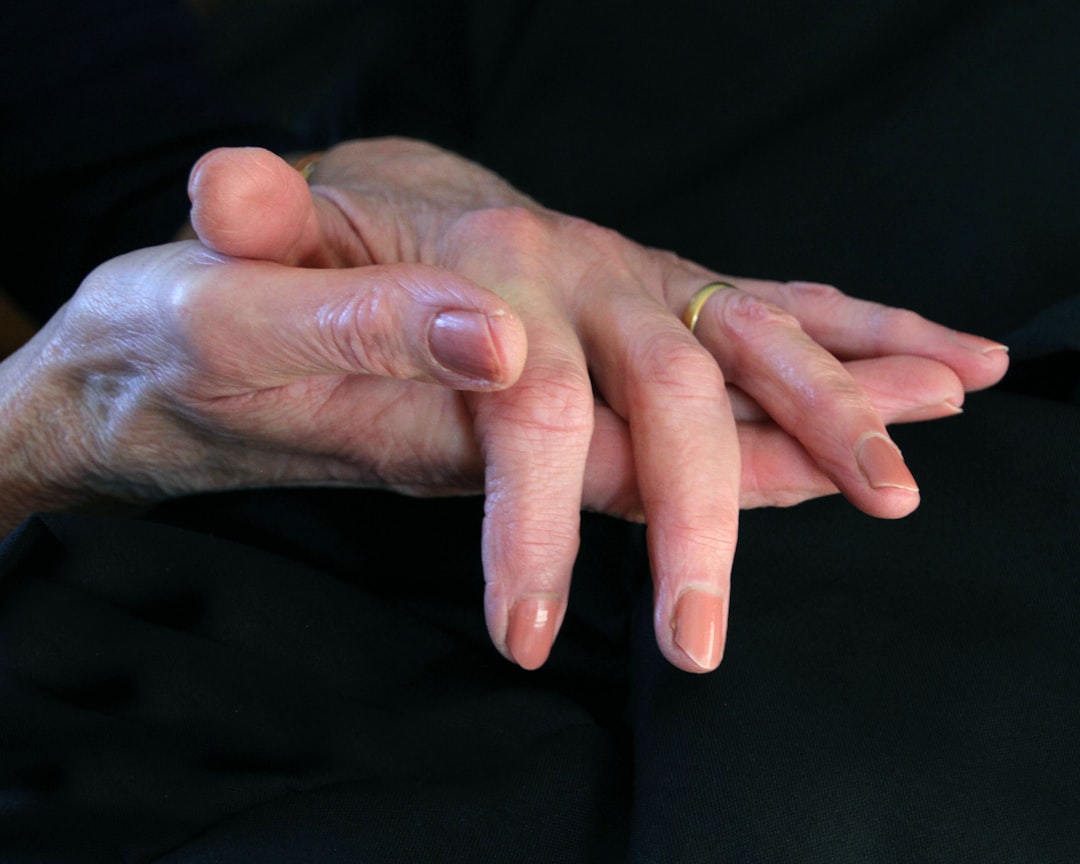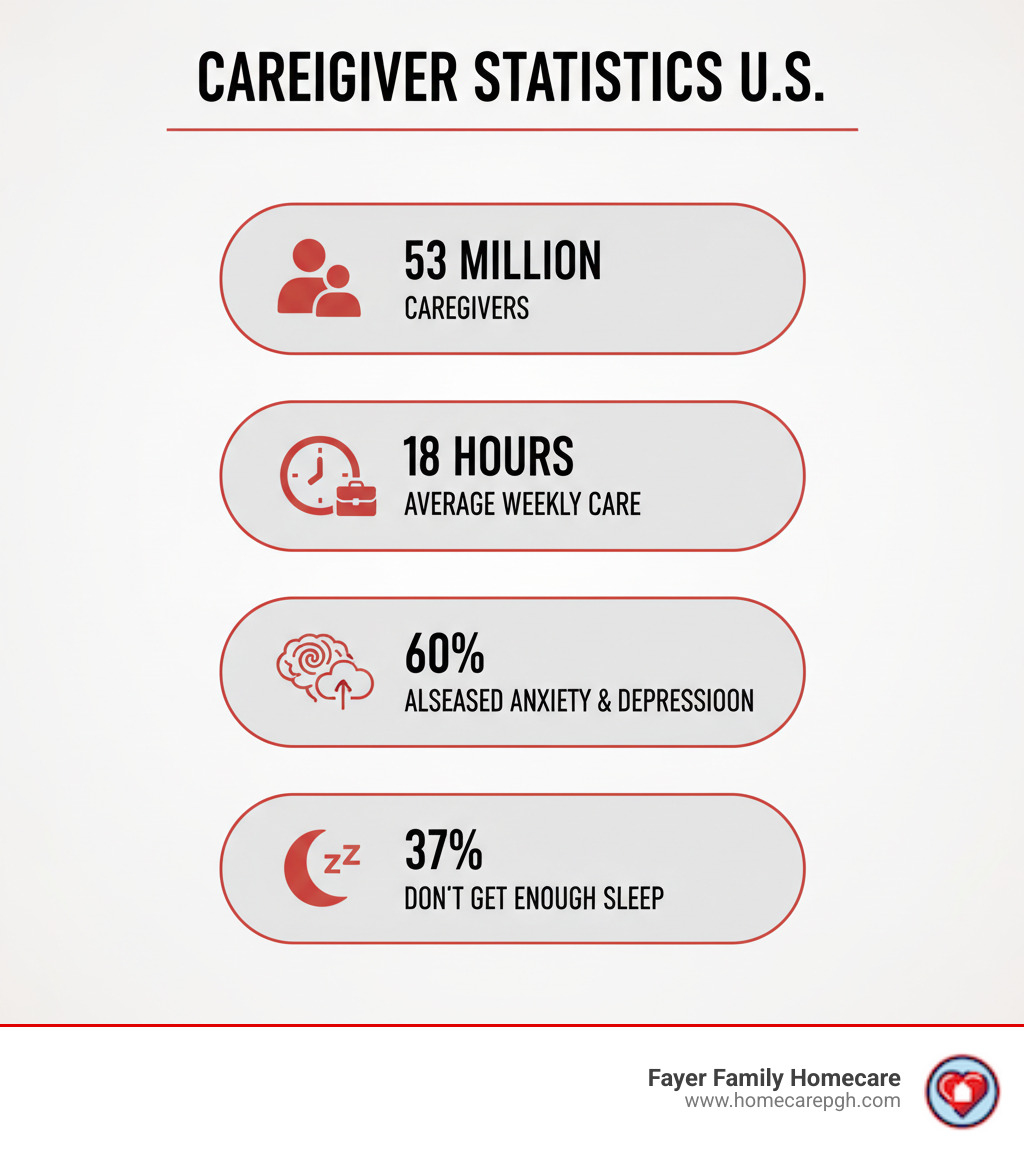
July 28, 2025
Home Sweet Home Forever? Aging in Place in Pittsburgh Made EasyDiscover Aging in place Pittsburgh tips, services, and resources to help seniors stay safe, independent, and happy at home.
Read Article
Support for caregivers isn't just helpful—it's essential for anyone caring for an elderly parent or loved one. Whether you're helping with daily activities, managing medications, or providing companionship, you're part of a much larger community.
Key Types of Caregiver Support:
The numbers tell an important story: about 1 in 5 U.S. adults are caregivers, contributing 36 billion hours of unpaid care annually. On top of that, three-fifths of caregivers also work other jobs while providing an average of 18 hours of care each week.
You're not alone in this journey. Nearly 40% of caregivers don't get enough sleep, and 47% report increased anxiety or depression. These challenges are real, but so are the available solutions and support systems.
As one caregiver shared with a support program: "I've learned that it is okay to ask for help. I'm not sure if I would have been able to continue supporting my loved one in the same way had I not been connected with this group."
The key is understanding that seeking support isn't a sign of weakness—it's a smart strategy that helps you provide better care while protecting your own health and well-being.

Support for caregivers vocabulary:
Caring for an elderly parent is meaningful but also incredibly hard. Support for caregivers becomes essential because this journey, while filled with love, brings challenges that can overwhelm anyone.
Emotional stress often hits first. Watching a loved one struggle with their health or dealing with difficult behaviors can lead to sadness, guilt, or anger. These feelings are normal but take a real toll, with nearly half of caregivers reporting increased mental health concerns.
The physical exhaustion also creeps up. Most family caregivers spend about 18 hours a week providing care, many while juggling full-time jobs. Nearly 37% of caregivers report not getting enough sleep, and the constant physical demands can leave you chronically tired and prone to illness.
Then there's the financial strain. You might cut back work hours or use personal savings for medical supplies and transportation. According to AARP's caregiving statistics, these financial pressures can stretch families thin and impact your own future security.
When these pressures combine, caregiver burnout becomes a real danger. It's a state of complete physical, emotional, and mental exhaustion where you feel detached or hopeless. About 60% of caregivers felt burned out in the past year, and it can decrease your ability to provide good care.
Social isolation often makes everything worse. You might cancel plans or skip gatherings, leaving you feeling like you're the only one going through this struggle, even though millions of others face the same challenges.
We often miss the warning signs our own bodies and minds are sending us. Recognizing when you need more support for caregivers isn't admitting defeat—it's getting help before you reach a breaking point.
Feeling overwhelmed is a constant sensation that you're drowning and can't keep up. If worry has become your constant companion, it's time to pay attention.
Sleep problems are a common physical sign. You might lie awake worrying or wake up tired even after a long night's sleep. With nearly 37% of caregivers not getting enough sleep, this is a shared struggle.
Your emotions might feel like a roller coaster. Increased anxiety, persistent sadness, or snapping at people you love are all red flags. Nearly half of caregivers experience these feelings, which deserve attention.
Physical symptoms often follow emotional stress. Frequent headaches, getting sick more often, or unexplained aches can be your body's way of signaling it needs relief, as chronic stress weakens the immune system.
Losing interest in things you used to enjoy is another important warning sign. If hobbies feel like chores or you're avoiding friends, your emotional reserves are running low.
Neglecting your own health is perhaps the most serious sign. Almost one-quarter of caregivers find it difficult to focus on their own health. Skipping your own appointments or eating poorly puts you on a path toward crisis.
As we explored in our article about Caring for the Caregiver: Tips for Self-Care in Senior Home Care, recognizing these signs early gives you the power to make changes. Getting help is the smartest thing you can do for both yourself and the person you're caring for.
Caring for an elderly loved one can feel isolating, but you don't have to carry the burden alone. Support for caregivers comes in many forms, helping you build a safety net to thrive. Think of it as a three-legged stool: emotional connections, practical help, and empowering knowledge.
Connecting with someone who truly gets it is powerful. When you share your struggles with other caregivers, they understand in a way others can't.
Support groups, whether in-person or online, are lifelines for sharing victories and struggles. The shared wisdom you'll gain is invaluable, from practical tips to emotional strategies.
One-on-one counseling with a therapist provides custom tools for managing stress, processing grief, and developing healthy coping strategies in a safe, private space.
Peer coaching connects you with experienced caregivers who've walked a similar path. They offer practical advice and emotional validation from a place of true understanding.
National helplines are available 24/7 for immediate support. These confidential services offer a listening ear and can connect you with local resources when you're having a tough day.
Emotional and peer support reminds you that your feelings are valid, your struggles are real, and your dedication matters. Find support groups and other services that can connect you with others who understand your journey.
Sometimes the most meaningful support for caregivers is an extra pair of hands. Practical support services provide tangible help to manage daily demands.
In-home respite care is essential. A trained caregiver comes to your home, allowing you to go to an appointment, run errands, or simply rest without worry. This temporary relief is crucial for preventing burnout.
Companion care provides your loved one with social interaction while giving you peace of mind. At Fayer Family Homecare, our caregivers connect with seniors, keeping them safe and emotionally supported.
Home health aides can help with bathing, dressing, and other personal care needs. Professional help with these physically and emotionally challenging tasks can preserve your loving relationship with your parent.
Light housekeeping and meal preparation services tackle the endless cycle of cleaning and cooking, freeing you to spend quality time with your loved one.
Transportation assistance ensures your loved one gets to appointments and social activities, relieving you of coordinating schedules and driving.
These practical supports create space in your life to breathe and be a loving family member, not just a care provider. Learn more about home care services that can support your family and see how we can customize a plan for your needs in the Greater Pittsburgh area.
Knowledge is power when navigating senior care. Informational and educational support transforms the unknown into manageable steps, reducing anxiety.
Online resource centers act as a 24/7 reference library, offering articles and guides on everything from medication side effects to signs of depression in seniors.
Workshops and webinars provide structured learning on topics like communication strategies for dementia or legal and financial planning, often with direct access to experts.
Disease-specific organizations like the Alzheimer's Association offer invaluable targeted resources, research updates, and support strategies for conditions like Alzheimer's, Parkinson's, or diabetes. Find resources for Alzheimer's caregivers to access this specialized support.
Advance care planning involves discussing and documenting your loved one's preferences for future medical care. These conversations reduce stress during a crisis and ensure your loved one's wishes are honored.
Educational support empowers you to advocate for your loved one, ask the right questions, and make informed decisions with confidence.
Taking care of yourself isn't selfish—it's a crucial part of being an effective caregiver. Like the airplane safety rule, you must put on your own oxygen mask first. A healthy caregiver provides better care and is better equipped for daily challenges. The statistics are clear: with nearly 37% of caregivers lacking sleep and almost a quarter struggling to focus on their own health, support for caregivers must include self-support.
Your body is working overtime and needs attention. Prioritizing sleep is vital; aim for 7 hours a night. Poor sleep weakens your immune system and clouds judgment.
Balanced nutrition provides fuel for the long haul. Focus on fruits, vegetables, and lean proteins for sustained energy, rather than relying on quick, processed foods.
Regular physical activity, even a 10-minute walk, can boost your mood and reduce stress. Staying strong and flexible helps prevent injuries from the physical demands of caregiving.
Don't skip attending your own doctor's appointments. Inform your provider that you're a caregiver so they can monitor for stress-related health issues.
Preventing back injuries is especially important. Learn proper lifting techniques and use assistive devices when needed. Don't try to be a hero.
As we explored in our article, The Essential Role of Caregivers in Home Health Care, maintaining your physical health is essential for providing consistent, quality care.
The emotional weight of caregiving can be overwhelming. This is where support for caregivers becomes deeply personal. Setting boundaries is essential. Learning to say no, delegating tasks, and defining what you can realistically handle protects your energy and your relationships.
Practicing mindfulness or meditation, even for five minutes, can reset your emotional state. Many free apps offer guided exercises for busy people.
Accepting help when offered is key. When a neighbor or sibling offers to help, say yes. People want to support you—let them.
Making time for hobbies, even for 15 minutes, can restore your sense of self. These moments remind you that you're more than just a caregiver.
Staying socially connected is more important than ever. Isolation feeds depression and anxiety. A quick phone call or video chat can remind you of your support network.
Learning about taking care of your own health and well-being is an ongoing process. When you prioritize your mental and emotional health, you approach caregiving with more patience and resilience.
We know that caring for an elderly loved one brings up countless questions. As family caregivers ourselves at Fayer Family Homecare, we've heard these concerns from families in the Greater Pittsburgh Area. Here are some of the most common questions about support for caregivers.
Burnout creeps up gradually. The key signs include chronic fatigue that isn't relieved by sleep, leaving you feeling exhausted no matter what. Another sign is feeling emotionally detached or cynical about your caregiving role, where compassion is replaced by numbness or resentment. This often comes with a sense of ineffectiveness or doubt. Other red flags include increased irritability, physical symptoms like frequent headaches or illness, changes in appetite or sleep, and withdrawing from social activities. Recognizing these signs is the first step toward getting help.
Several avenues for financial support exist, though they vary by location. Start with the National Family Caregiver Support Program (NFCSP), which funds state and local services like respite care. Your local Area Agency on Aging can help you apply. Medicaid waivers in many states can also fund in-home care. If your parent has long-term care insurance, review the policy, as it may cover home care services. For veterans, the VA offers programs like the Program of Comprehensive Assistance for Family Caregivers, which can provide a financial stipend. Finally, don't overlook tax credits and deductions related to caregiving costs.
When you're at your breaking point, immediate help is available. If you're in crisis, call or text 988 for the Suicide and Crisis Lifeline to connect with a trained counselor 24/7. For urgent, non-crisis support, especially if your loved one has dementia, the Alzheimer's Association offers a 24/7 Helpline at 800-272-3900. They provide guidance and emotional support. Your local Area Agency on Aging is another key resource for connecting with emergency respite options and other local services. Finally, contact your doctor if you feel persistently sad or anxious; they can connect you with professional support. Reaching out is a sign of strength.
The journey of caregiving is a profound expression of love, but as we've found throughout this guide, support for caregivers isn't just helpful—it's essential for your well-being and ability to provide quality care.
You're part of a community of over 53 million caregivers in the U.S., contributing to 36 billion hours of unpaid care annually. This highlights why you deserve robust support systems.
We've explored how emotional support lifts the weight of isolation, practical support like respite care prevents burnout, and informational resources empower you to make confident decisions. Most importantly, caring for yourself is the foundation of effective caregiving. Prioritizing your physical and mental health isn't selfish; it's a strategic way to sustain your ability to care.
If you feel overwhelmed, remember the warning signs and the immediate help that's available, from the 988 Crisis Lifeline to your local Area Agency on Aging. Support is just a phone call away.
Here in the Greater Pittsburgh Area, organizations like Fayer Family Homecare understand these challenges. We know that behind every person receiving care is a family caregiver who needs support too. Our experienced caregivers provide specialized care for individuals with aging needs, dementia, or Alzheimer's, offering the companionship and personal care that give you essential breaks.
The most important thing to remember? You don't have to do this alone. Building your support team, accepting help, and extending the same compassion to yourself that you give so freely to others is necessary.
Your caregiving journey is filled with love and purpose. With the right support systems in place, you can continue this meaningful work while protecting your own health and happiness.
Learn more about home care services that can support your family and find how we can become part of your support network, helping you provide the best care possible while taking care of yourself too.
